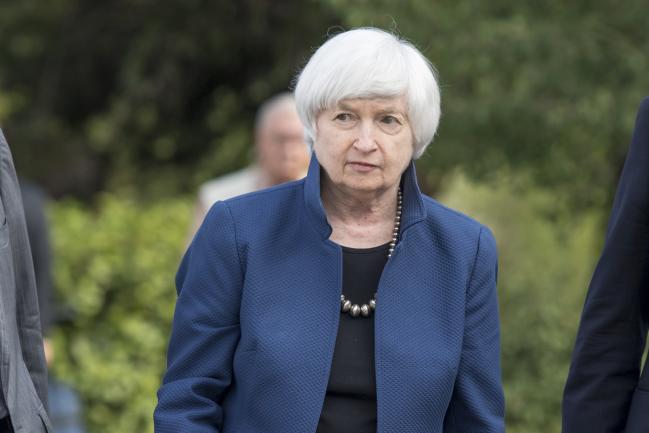(Bloomberg) -- Federal Reserve Chair Janet Yellen defended the central bank’s use of unconventional and often unpopular monetary policy tools after the Great Recession, highlighting some of her achievements at the helm as President Donald Trump weighs her reappointment.
“The U.S. economy is much stronger today than it would have been without the unconventional monetary policy tools deployed by the Federal Reserve in response to the Great Recession,” Yellen said in Washington on Friday.
Yellen, on a short list of potential Fed chairs being reviewed by Trump, made the case for preserving policy makers’ ability to confront the next recession with more bond purchases, a strategy known as quantitative easing aimed at lowering borrowing rates.
“While I believe that influencing short-term interest rates should continue to be our primary monetary policy lever in normal times, our unconventional policy tools will likely be needed again should some future economic downturn drive short-term interest rates back to their effective lower bound,” Yellen said.
Yellen and her predecessor Ben Bernanke were heavily criticized by Republicans in Congress for bloating the Fed’s balance sheet with $3.5 trillion in Treasuries and mortgage-backed securities. They often claimed the effort only served to encourage government deficit spending and risk-taking by investors.
Gradual Unwind
The Fed began shrinking that balance sheet this month.
“One should recognize that the recovery could have been much slower in the absence of our unconventional tools,” Yellen said. She said that evidence “strongly suggests” that bond purchases helped spur economic activity and lower unemployment.
If the Fed does consider bond purchases again, it’s unclear whether Yellen will have any role. Her four-year term as chair is set to expire in February.
Trump said earlier on Friday he’s considering Yellen along with Fed Governor Jerome Powell, Stanford University professor John Taylor and “a couple of others.”
“Most people are saying it’s down to two -- Mr. Taylor and Mr. Powell,” Trump said in an interview with Fox Business to be broadcast on Sunday and Monday. “I also met with Janet Yellen, who I like a lot, I really like her a lot,” he said. “So I have three people that I’m looking at, and there are a couple of others. I’d say I will make my decision very shortly.”
Forward Guidance
Taylor has questioned bond-buying. If rates were to return to zero, he has suggested it would be sufficient to rely on public assurances by the Fed to hold rock-bottom rates for an extended period of time -- a communications strategy known as forward guidance -- to help bring long-term borrowing costs down.
Amid the drama surrounding the Fed chair selection, officials are still struggling to understand contradictory economic data and what that should mean for monetary policy.
The Federal Open Market Committee hiked rates in March and June, primarily spurred by the expectation that robust job gains would eventually raise wages and inflation. Surprisingly low inflation in recent months, however, has caused several policy makers to waiver in their resolve to move again in December.
Unemployment fell to 4.2 percent in September, its lowest level in more than 16 years. Despite that, the Fed’s favorite measure of inflation languished at 1.4 percent in the 12 months through August, well below the central bank’s 2 percent target.
Yellen has called this a “mystery,” but has signaled her desire to continue raising rates gradually. Investors see the probability of a December hike at about 80 percent, according to pricing in federal funds futures contracts.
Noting that the economy is operating near maximum employment and inflation is expected to rise to 2 percent over the next couple of years, Yellen said Friday the U.S. economy has made “great strides.”
Trump is pushing Congress to overhaul the U.S. tax code. Yellen declined to comment directly on measures being debated on Capitol Hill and said the response of the central bank to fiscal stimulus would depend on the nature of the tax package that is put into effect.
She said that given low U.S. potential growth and tepid productivity, “my personal hope is that whatever Congress passes will be a package that is rich in incentive-effects on the supply side that would boost capital formation and spur productivity growth.”
(Updates with Yellen comment on tax reform in final paragraph.)
